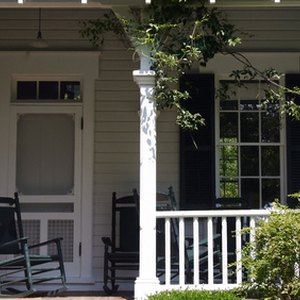
Eviction is a legal procedure by which a landlord can force a tenant out of a property and reclaim it for himself. Virginia, like most states, has strict laws that govern the eviction process. If you want to avoid eviction, or it you believe that your landlord has no grounds for eviction, you have several options for avoiding eviction from your home.
Comply with the requirements set down in the landlord's written notice. In Virginia, a landlord must give you written notice that she intends to have you evicted. In some cases, the notice will give you a certain amount of time to correct a problem (late rent, an unauthorized pet or too much noise, for example) before official eviction proceedings can begin.
Negotiate with your landlord. Evictions cost landlords both time and money. You may be able to renegotiate your lease or rental agreement, make a payment arrangement or come up with a plan for you to leave voluntarily at a time that works for both you and the landlord.
Gather your documentation. If your landlord is determined to have you evicted and you believe that the landlord does not have grounds to evict you, you will need defend yourself in court. Documentation should include rent checks, rent receipts, copies of your lease and any communications between you and the landlord regarding rent payment or other problems with your home.
Exercise your right of redemption. If you are being evicted for non-payment of rent, you can avoid eviction by paying all rent due, plus any court costs, late fees and attorney fees prior to, or on the day of, your court hearing. You must notify the judge that this payment was made.
Go to court. Your landlord must have you served with notice of the scheduled court date. If you are unable to be at the court date, you can ask the court for a continuance Present your defense to the judge, who will decide whether or not the landlord's case against you has merit.
Tips
If you can afford a lawyer or get one through Legal Aid, do so. A lawyer can often help you to fight the eviction or get you more time to remain in your home.
Warnings
An eviction is a matter of public record and can make it very difficult for you to get a new place to live. If you don't have a good defense against a threatened eviction, it may be wise to leave voluntarily prior to the landlord's filing an eviction case against you.
Withholding rent so that you can make repairs is not a defense against eviction in Virginia. If your landlord fails to make repairs, you must bring an action called a "Tenants Assertion" to court, and pay your rent directly to the court.
References
- Leiserlaw: Frequently Asked Questions
- Nolo: How Evictions Work
- American Landlord. "State Eviction Laws for Curable Violations." Accessed Oct. 6, 2020.
- Justia. "Eviction." Accessed Oct. 6, 2020.
- Nolo. "How to Delay an Eviction." Accessed Oct. 6, 2020.
- Experian. "How Does an Eviction Affect Your Credit Report?" Accessed Oct. 6, 2020.
- Fair Credit Reporting Act. "§ 1681c. Requirements Relating to Information Contained in Consumer Reports." Accessed Oct. 6, 2020.
Tips
- If you can afford a lawyer or get one through Legal Aid, do so. A lawyer can often help you to fight the eviction or get you more time to remain in your home.
Warnings
- An eviction is a matter of public record and can make it very difficult for you to get a new place to live. If you don't have a good defense against a threatened eviction, it may be wise to leave voluntarily prior to the landlord's filing an eviction case against you.
- Withholding rent so that you can make repairs is not a defense against eviction in Virginia. If your landlord fails to make repairs, you must bring an action called a "Tenants Assertion" to court, and pay your rent directly to the court.
Writer Bio
Lainie Petersen writes about business, real estate and personal finance, drawing on 25 years experience in publishing and education. Petersen's work appears in Money Crashers, Selling to the Masses, and in Walmart News Now, a blog for Walmart suppliers. She holds a master's degree in library science from Dominican University.

